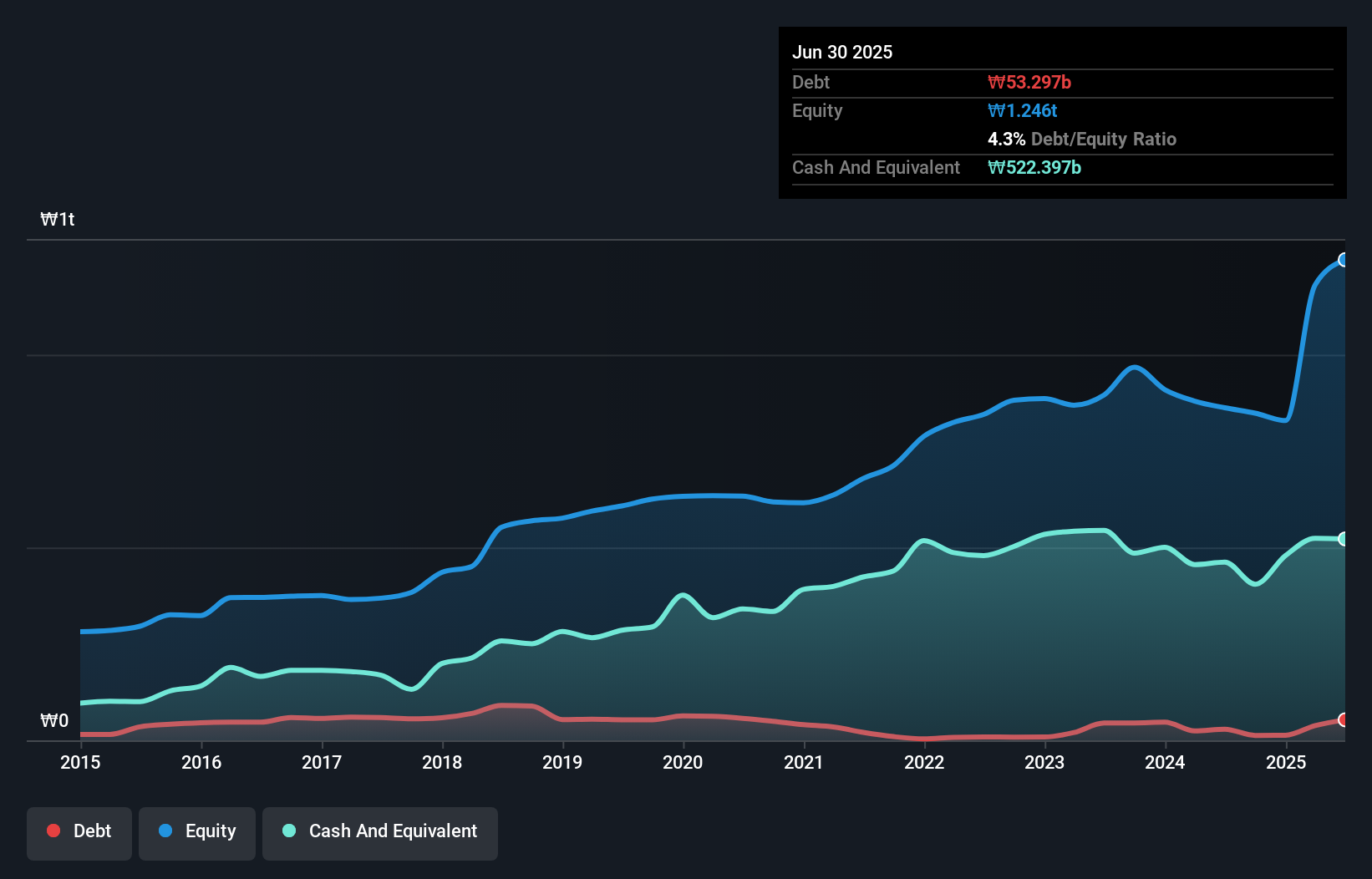- South Korea
- /
- Entertainment
- /
- KOSDAQ:A041510
SM Entertainment (KOSDAQ:041510) Has A Rock Solid Balance Sheet
Some say volatility, rather than debt, is the best way to think about risk as an investor, but Warren Buffett famously said that 'Volatility is far from synonymous with risk.' When we think about how risky a company is, we always like to look at its use of debt, since debt overload can lead to ruin. As with many other companies SM Entertainment Co., Ltd. (KOSDAQ:041510) makes use of debt. But the real question is whether this debt is making the company risky.
What Risk Does Debt Bring?
Debt and other liabilities become risky for a business when it cannot easily fulfill those obligations, either with free cash flow or by raising capital at an attractive price. If things get really bad, the lenders can take control of the business. However, a more frequent (but still costly) occurrence is where a company must issue shares at bargain-basement prices, permanently diluting shareholders, just to shore up its balance sheet. Of course, debt can be an important tool in businesses, particularly capital heavy businesses. The first thing to do when considering how much debt a business uses is to look at its cash and debt together.
What Is SM Entertainment's Debt?
You can click the graphic below for the historical numbers, but it shows that as of June 2025 SM Entertainment had ₩53.3b of debt, an increase on ₩28.8b, over one year. But it also has ₩522.4b in cash to offset that, meaning it has ₩469.1b net cash.

How Healthy Is SM Entertainment's Balance Sheet?
We can see from the most recent balance sheet that SM Entertainment had liabilities of ₩521.2b falling due within a year, and liabilities of ₩131.7b due beyond that. Offsetting these obligations, it had cash of ₩522.4b as well as receivables valued at ₩199.4b due within 12 months. So it can boast ₩68.8b more liquid assets than total liabilities.
This short term liquidity is a sign that SM Entertainment could probably pay off its debt with ease, as its balance sheet is far from stretched. Simply put, the fact that SM Entertainment has more cash than debt is arguably a good indication that it can manage its debt safely.
See our latest analysis for SM Entertainment
Also positive, SM Entertainment grew its EBIT by 26% in the last year, and that should make it easier to pay down debt, going forward. The balance sheet is clearly the area to focus on when you are analysing debt. But ultimately the future profitability of the business will decide if SM Entertainment can strengthen its balance sheet over time. So if you're focused on the future you can check out this free report showing analyst profit forecasts.
Finally, a company can only pay off debt with cold hard cash, not accounting profits. While SM Entertainment has net cash on its balance sheet, it's still worth taking a look at its ability to convert earnings before interest and tax (EBIT) to free cash flow, to help us understand how quickly it is building (or eroding) that cash balance. Over the most recent three years, SM Entertainment recorded free cash flow worth 71% of its EBIT, which is around normal, given free cash flow excludes interest and tax. This free cash flow puts the company in a good position to pay down debt, when appropriate.
Summing Up
While we empathize with investors who find debt concerning, you should keep in mind that SM Entertainment has net cash of ₩469.1b, as well as more liquid assets than liabilities. And we liked the look of last year's 26% year-on-year EBIT growth. So is SM Entertainment's debt a risk? It doesn't seem so to us. There's no doubt that we learn most about debt from the balance sheet. However, not all investment risk resides within the balance sheet - far from it. For example - SM Entertainment has 2 warning signs we think you should be aware of.
If you're interested in investing in businesses that can grow profits without the burden of debt, then check out this free list of growing businesses that have net cash on the balance sheet.
New: Manage All Your Stock Portfolios in One Place
We've created the ultimate portfolio companion for stock investors, and it's free.
• Connect an unlimited number of Portfolios and see your total in one currency
• Be alerted to new Warning Signs or Risks via email or mobile
• Track the Fair Value of your stocks
Have feedback on this article? Concerned about the content? Get in touch with us directly. Alternatively, email editorial-team (at) simplywallst.com.
This article by Simply Wall St is general in nature. We provide commentary based on historical data and analyst forecasts only using an unbiased methodology and our articles are not intended to be financial advice. It does not constitute a recommendation to buy or sell any stock, and does not take account of your objectives, or your financial situation. We aim to bring you long-term focused analysis driven by fundamental data. Note that our analysis may not factor in the latest price-sensitive company announcements or qualitative material. Simply Wall St has no position in any stocks mentioned.
About KOSDAQ:A041510
SM Entertainment
Engages in music/sound production, talent management, and music/audio content publication activities in South Korea and internationally.
Flawless balance sheet with solid track record.
Similar Companies
Market Insights
Community Narratives



